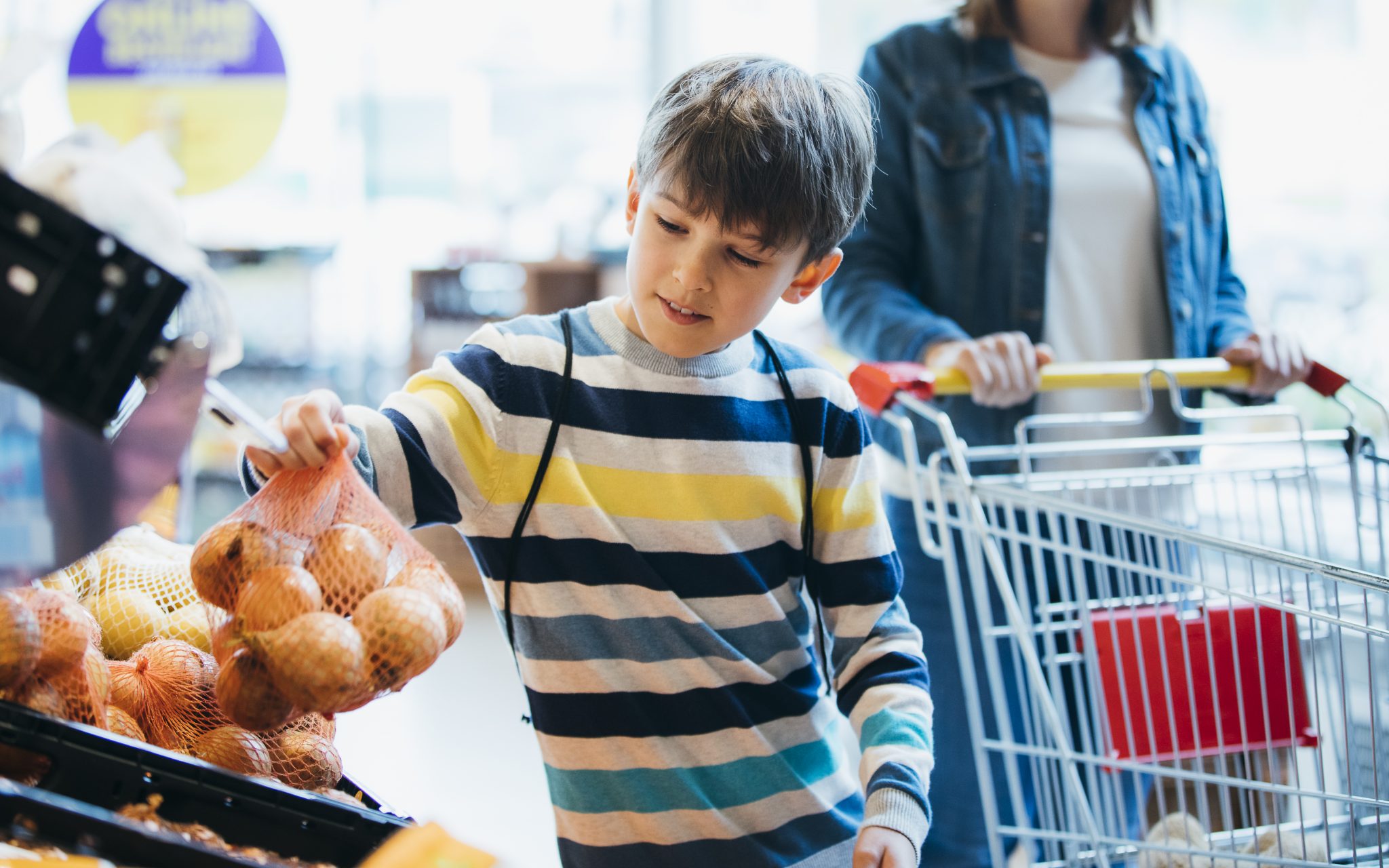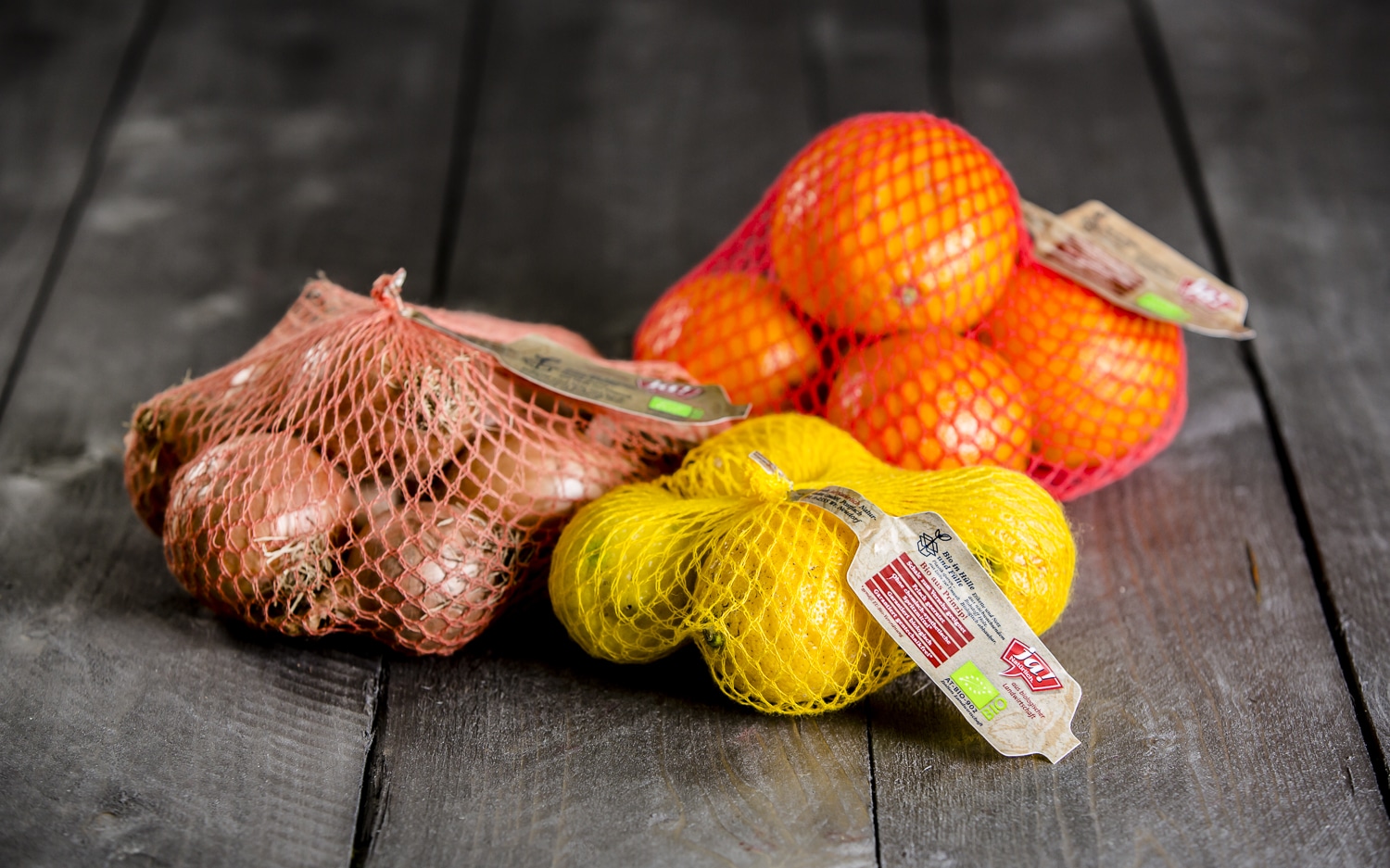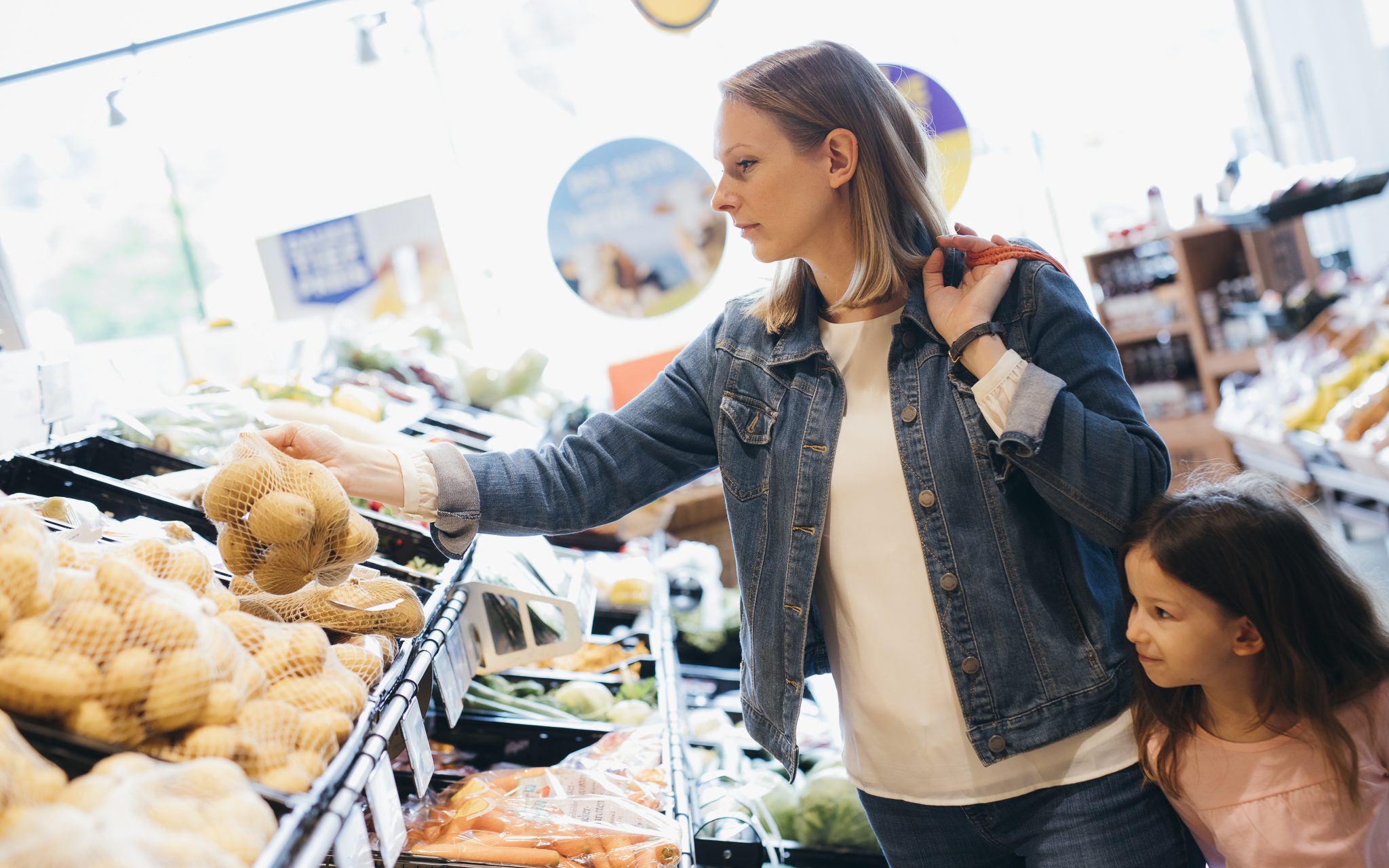10 years of Packnatur® beechwood netting at
Ja! Natürlich
In a joint effort of the companies LENZING (fibre manufacturer), BORCKENSTEIN (spinning mill), EOM ERZEUGERORGANISATION MARCHFELDGEMÜSE (packing plant for organic vegetables), HENNING (net production) and VPZ VERPACKUNGSZENTRUM, it was possible, after a joint development period of two years, to present the Austrian REWE Group a perfect replacement for the plastic net that almost completely dominated the market, and thus to develop a world first that is now internationally successful and generates a high added value for Austria.
“Organic” suits Austria and has a model effect. This is demonstrated by the Austrian REWE Group, which developed Ja! Natürlich, Europe’s first organic brand, more than 20 years ago and LENZING AG, the world market leader in ecological cellulose fibre production. Domestic beechwood from the thinning of certified forests is used. VPZ VERPACKUNGSZENTRUM has been researching biogenic packaging for more than 30 years out of conviction and has been able to build up a multi-award-winning industrial operation in Neudau in Styria (Austria) with this innovative packaging idea in recent years.
We asked our very first project partners for a short statement. Furthermore, we would like to take this opportunity to thank the people who made the conscious decision to take part in the project twelve years ago and who were involved in the research and development process: Barbara Sattler, MA (REWE Group), Dr. Marina Crnoja-Cosic (LENZING AG), Manfred Kern (BORCKENSTEIN), Dr. Christian Schett (EOM) and Werner Henning.



DI Dr. Steidl, Managing Director Ja! Natürlich GmbH
Dr. Steidl, as a pioneer in the field of green packaging, REWE Group in Austria has made a decisive contribution to successfully establishing this innovation in the market. In 2019, you received the Energy Globe Award for your “Green Packaging” initiative. Does our product still add value for you? Green Packaging was followed by other projects such as “Healthy Soils”, “Animal Welfare” and “Biodiversity”. Is environmental, climate and species protection part of your quality assurance? And how does that pay off economically?
“Congratulations! Ja! Natürlich has been inspired by this philosophy and we share a common great goal here. More than ten years ago, long before the term “green packaging” was the talk of the town, Ja! Natürlich started to omit packaging wherever possible and to replace it with more environmentally friendly alternatives where necessary. One of the best examples of an ecological packaging alternative is the innovative, compostable cellulose net, which was quickly used to package everything from citrus fruits, potatoes and onions to black radishes at Ja! Natürlich and is still in use here. The advantages of cellulose netting, however, lie not only in its ecology, but also in its pleasant feel and gentle handling of the products. Especially with citrus fruits, this aspect is of particular relevance for Ja! Natürlich. This is because there must not be any surface conservation when it comes to citrus fruits in order to prevent the formation of mould or premature spoilage. The sustainable cellulose nets are particularly gentle in this respect and are therefore, then as now, a perfect alternative to plastic packaging material. And if we may also wish for something in the future, it would be for a compostable solution for the closure of the net instead of the metal clip.”
Georg Raffael Spindler, MSc, Manager Speciality Applications, Lenzing AG
Mr Spindler, Lenzing AG has established its own “LENZING™ for Packaging” division in the course of the joint development of Packnatur® nets. The quantities are still small for a large enterprise such as yours. Nevertheless, your company is committed to this field apart from its main fields of activity “textile & nonwoven applications”. How do you assess the potential for the future and what makes the new application so interesting for your company? The global interest for the topic “replacement of plastic packaging”? The European value chain? New opportunities away from the highly competitive clothing market?
“When Lenzing AG, in close cooperation with VPZ/Packnatur®, started developing compostable fruit and vegetable nets many years ago no one would have thought that this application would develop so successfully. Today, LENZING™ for Packaging is an established segment for Lenzing and makes an important and steadily growing contribution to the diversification of the Lenzing application portfolio. Especially in times when the textile industry is subject to great uncertainty and declining demand due to various crises, we are all the more pleased about the joint growth with VPZ/Packnatur®. I expect the demand for ecologically sustainable nets to continue to grow strongly in the future. This is due, on the one hand, to changes in legal regulations such as those recently introduced in France (accelerated Single-Use-Plastic-Directive), and on the other hand, to greater consumer awareness. Both factors will continue to lead to a change in the mindset on the part of supermarkets/manufacturers. I and the entire Lenzing AG are looking forward to the continued close cooperation with VPZ and the many success stories that the Packnatur® brand is guaranteed to write in the future.”
DI Herbert Bucher, Managing Director, Erzeugerorganisation Marchfeldgemüse
DI Bucher, Packnatur® nets have become “business as usual” and are indispensable today. The organic vegetable market is growing thanks to the increasing need of consumers to select healthier food. Healthier for people and healthier for the environment. You are always willing to try out new ideas on your packing machines. This is not a matter of course in a business that has to function in a very efficiently timed manner, works with a product that is climate-dependent and whose price has to be renegotiated in the market every day. Pioneering is part of your DNA and in the long run probably also your recipe for success in running one of the largest packing companies in Austria. What is important for you in the cooperation with us?
“… first of all, thank you for the many years of good cooperation! It is important to us that we have a competent partner at our side at all times who supports us in implementing the requirements of our customers. Innovative packaging is indispensable for marketing our vegetable products. In a very fast-moving business environment, we need short time spans from the creation of an idea to the finished packaging. The Packnatur team supports us competently and solution-oriented as well as with the necessary eye for economic feasibility. I look forward to many more years of constructive cooperation and wish our partner all the best!”
Ing. Manfred Kern, Packnatur Neudau
As managing director of Borckenstein GmbH, Manfred Kern created the suitable yarn profile for us and is now the managing director of our Packnatur production plant in Neudau. The original idea of locating our production next to the yarn manufacturer for logistical reasons has remained a commitment to the site despite the unstoppable closure of Borckenstein GmbH due to price pressure on the international market. Employees from the former yarn production now work in our production. The first production hall was built in 2019, and the fourth will go into operation in mid-2023. What made you decide to get involved in the project and build the Packnatur industrial plant in Neudau?
“When company founder Helmut Meininger approached me with this idea more than 20 years ago, I found it very interesting as former director of the board of Borckenstein spinning mill and developed a suitable yarn together with the fibre producer Lenzing AG. The idea caught on; when the market potential matured and demand grew accordingly, the joint decision was made to set up an industrial production. The Neudau site was the obvious choice, as employees with textile knowledge were available after the closure of the Borckenstein company. Within just under four years after the start of production, the third expansion stage went into operation in 2022. The fourth production hall is expected to go into operation in mid-2023. As chairman of the textile industry of the WKÖ, I am also very pleased that a new area of application has opened up here for the textile industry, and thus new jobs have been created through innovative investments.”

